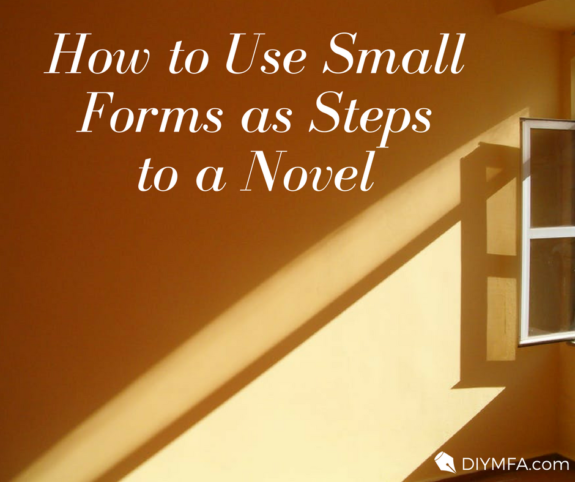November is a difficult month for me. My struggle has nothing to do with visiting relatives, cleaning sprees or the holidays, though. It’s the whole novel writing thing. NaNoWriMo. (If somehow you’ve missed what NaNoWriMo is, listen to this podcast, Episode 169: Boost Your Creative Mojo with Grant Faulkner.)
Beginning each October, the NaNo fever ratchets up. For two to three months, the writing world is consumed with generating 50,000 words in 31 days and what to do after NaNoWriMo ends.
I’ve been writing for quite a few years now. I’ve written across multiple genres. But I’ve not yet conquered writing a novel.
I’ll confess that I’ve only recently completed any fiction. The thought of tackling a novel is overwhelming to me. I often wonder if my novel-writing fear is married to my love of short literary forms. However, I find that many of my writer friends, who prefer longer literary forms, share the same writing anxiety.
Small Forms to the Rescue
One writing life constant is working on improving one’s craft. My beloved short forms take some of the novel-writing fear away. So, I tackle that hard-to-scale, 50,000-word mountain in short-form increments. With lots of practice runs in the form of timed writings and transforming poems into short stories.
My first bit of successfully written (and published) fiction, Let it Go, came out of a timed writing exercise and a real-life observation during lunchtime rush hour. At the time, daily timed-writing stints primed me to see stories everywhere. And translate them quickly and succinctly into words.
Poems — narrative or lyric — often have good building blocks for stories. Dream poems are especially suited to story construction. While normal boundaries are mostly non-existent in dreaming, complex and surprising storytelling abounds. Poems constructed from dreams and dream fragments overflow with imagery, sensation and the most inventive dialogue. These elements make for the best narrative and lyric poetry.
Another of my fiction-writing attempts evolved from a dream. I wrote the poem, Absurdity, 12:32 a.m, immediately after waking up from the dream it describes:
I dreamt Tyrannosaurus Rex was loose in our neighborhood
but not the dinosaur of paleontology.
My T. Rex was only six five or seven foot
and worked in the local pharmacy.
Somehow I never spotted him, even though
there was an APB out for him.
Closest I got was the two black bears
that asked me out on a date.
(Odd what rambles around in our brains.) Absurdity, 12:32 a.m., a narrative poem, tells a story and easily adapts itself to a longer, broader telling. I expanded my 60-word poem into the 657-word story, 12:32 a.m.
Here’s an excerpt:
“Adventure,” Aurora said, “starts at 12:32 a.m.”
That’s when things start to slow down a little. At least in our just-a-speck-larger-than-small town. That’s also when, she swore, she spotted T. Rex in a white coat counting out pills at her Rexall from her spot in the drive-thru.
Of course, I knew she was lying or high because she ain’t even got a Rexall in her neighborhood. Hell, ain’t no Rexall even in our city. That’s when I told her, “Rori. First thing, ain’t no Rexalls around here. And another thing–.
She cut me off, all haughty-like and says, “Don’t you be calling me no Rori. My name’s Aurora. That’s what my mama named me and that’s what you gone call me.”
Of course, that’s when I sighed real heavy-like. Then I said all drug out, “Oookay. Miss Aurora.”
I leaned on that Miss real hard, you know?
“Okay, Miss Aurora,” I said again. For effect.
“Another thing, ain’t no T. Rex working in no pharmacy. Girl, you high.”
“Was, too. You wadn’t there in the truck with me. So you don’t know what I saw.”
I sighed again. That girl makes a body sigh a lot when you got to talk to her.
“Listen, Rori. I mean, Aurora. T. Rex can’t count no pills out. It’s a dinosaur, not some person. It ain’t smart enough. Plus, its arms too short to scoot them little pills into them plastic yellow bottles.”
Most story elements were already there in the poem: a loose plot, nascent voice, a narrator, suspense, surprise, and an ending. In translating it into a longer form, I tighten the storytelling, flesh it out with more detail, add characters, and set it all within a conversation between erstwhile friends.
I’m sure the story itself can most definitely use an experienced fiction writer’s eye but I’m more than pleased that I did it. I created something recognizable as fiction.
I, of course, find working with less than three pages, much less intimidating than 200. I’m able to manipulate characters, plot, dialogue, and action. All within a much more compact and approachable space.
Paths to Success?
I remind myself that there’s more than one way to get there. The road to writing a novel doesn’t have to be a straight path. There can be detours; I have other stories with which I practice my growing fiction-writing skills. I chip away at them paragraph block by paragraph block. Testing different formats and settings, voices and plots to find the right combination for each story.
I know too that each word written counts. Novels don’t have to be written in one frenzy of writing. I tell myself not to look at those 50,000 words. I do what I need to get there. Word by word.
 Brenda Joyce Patterson is a poet, writer, librarian, and lover of short writing forms. Her poetry and flash fiction have been published in Vayavya, Gravel Magazine, and Melancholy Hyperbole. Along with works by Maya Angelou, Gwendolyn Brooks, and Alice Walker, her travel essay “The Kindness of Strangers” appeared in Go Girl: The Black Woman’s Guide to Travel and Adventure.
Brenda Joyce Patterson is a poet, writer, librarian, and lover of short writing forms. Her poetry and flash fiction have been published in Vayavya, Gravel Magazine, and Melancholy Hyperbole. Along with works by Maya Angelou, Gwendolyn Brooks, and Alice Walker, her travel essay “The Kindness of Strangers” appeared in Go Girl: The Black Woman’s Guide to Travel and Adventure.







